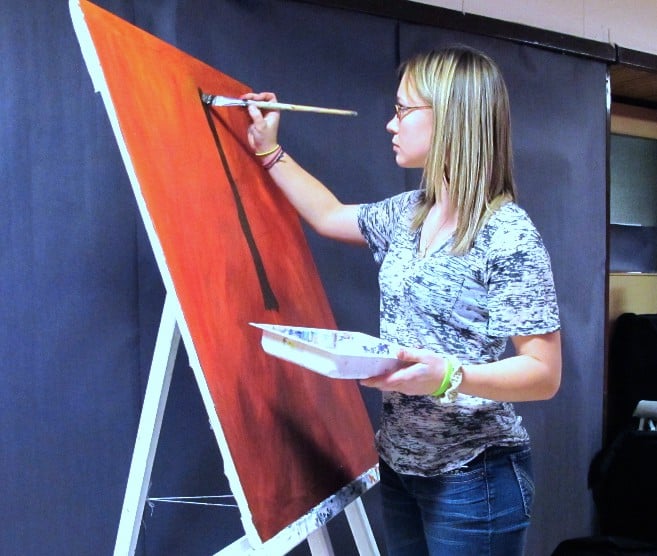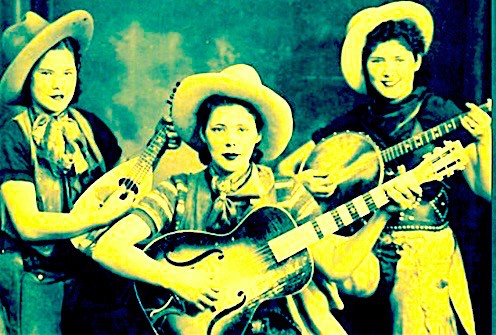Sometime during the Renaissance, Florentine artist, critic, and man about town Giorgio Vasari says to his best friend Michelangelo (yes, that Michelangelo), “Hey Titian’s in town—let’s go visit his studio.” M. is down with that and the two guys check out Titian’s studio. “And as artists always do,” Vasari continues, “we praised Titian’s new paintings to the skies.” But as soon as they left the studio Michelangelo turns to Vasari and says, “too bad Titian can’t draw!”
This charming anecdote proves that the practice of praising someone’s work to their face, and then excoriating it behind their backs, is nothing new.
Here’s an all-too-common variation: someone tells me that they are going to see an exhibition by Q. “I just love Q so I know I’ll love his exhibit.” I am being told that because someone is a friend of Q, that therefore they will approve of Q’s artwork.
A disconnect of logic is going on here! Just because you are friends with Q, doesn’t mean that therefore you will find Q’s artwork wonderful. You might very well find it worthy of your applause, your support, your respect (given how much effort, planning, etc. went into the creation of it) but there is no necessary connection between liking Q and liking Q’s artwork. None. Furthermore (and here I begin to zero in on my real pet peeve) praising Q is not equivalent to supporting Q.
 “I like to support the arts,” so many community-minded folks tell me. “I go to the openings, I buy stuff at Open Studios. I tell my friends how good the work is and encourage them to go, see, and purchase.” It’s one thing to be a good friend and make sure that your buddy’s theater piece doesn’t play to a house of empty seats. You want to support their hard work, so you go and applaud loudly afterwards. That’s being a good friend.
“I like to support the arts,” so many community-minded folks tell me. “I go to the openings, I buy stuff at Open Studios. I tell my friends how good the work is and encourage them to go, see, and purchase.” It’s one thing to be a good friend and make sure that your buddy’s theater piece doesn’t play to a house of empty seats. You want to support their hard work, so you go and applaud loudly afterwards. That’s being a good friend.
But what if you go, and realize that for whatever reason (lack of rehearsal time, lack of experience, lack of training, etc.) the performance you’ve seen is not wonderful. Perhaps it has some charming moments, or not. But in your heart of hearts you know that this is not the way Bob Dylan (or Maria Callas, or U2, or Laurence Olivier) got started.
Question: are you still being a good friend if you refuse to be candid? if you pledge your unconditional approval of their earnest, but cliché-filled attempt? Is it really helpful to heap praise upon something you know to be not entirely worthy of it? (The bigger question is: is it even ethically appropriate to praise something that is mediocre? We’ll leave that question for now.)
 A big part of the need to participate in feel-good situations involving creative output and willing consumers is to provide mutual support in a cultural context. I come to your event, you come to mine. We both win. Well, we do if by “winning” is meant we both feel immediate gratification and ego reinforcement. The obvious and ubiquitous example of this is the iron fist of social media, emblemized by Facebook, in which “conversations” begin, undergo rapid-fire reinforcements and thumbs-up,
A big part of the need to participate in feel-good situations involving creative output and willing consumers is to provide mutual support in a cultural context. I come to your event, you come to mine. We both win. Well, we do if by “winning” is meant we both feel immediate gratification and ego reinforcement. The obvious and ubiquitous example of this is the iron fist of social media, emblemized by Facebook, in which “conversations” begin, undergo rapid-fire reinforcements and thumbs-up, ![]() and then come to a close with an onslaught of emoticons, the Happy Face closure of a digital happy dance.
and then come to a close with an onslaught of emoticons, the Happy Face closure of a digital happy dance.
In his review of A.O. Scott’s Better Living through Criticism, Daniel Mendelsohn notes Scott’s insight that “art, like criticism, is more reactive—more ‘critical’—than many who idolize ‘creativity’ would acknowledge: Manet is conducting a passionate argument with Titian and Velázquez,†“Les Demoiselles d’Avignon†is a dialogue with African masks and statuary. Both art and criticism originate in “the urge to master and add something to realityâ€; both are characterized by a “transformation of awe into understanding.â€
 In other words, many seasoned art watchers contend that what art is not, is simply feel-good self-expression. That’s “making things.” Making yourself happy by making something that pleases you. No one would ever take away our right to make ourselves happy. But should we call everything we make, “art”?
In other words, many seasoned art watchers contend that what art is not, is simply feel-good self-expression. That’s “making things.” Making yourself happy by making something that pleases you. No one would ever take away our right to make ourselves happy. But should we call everything we make, “art”?
If we suppress our critical instincts and applaud every effort, no matter how self-indulgent, sketchy, or embarrassing, aren’t we essentially lying to the feckless creator? If I give an “A” to every one of my students, am I not only failing to be honest but also undermining the excellence of those whose work is clearly on a whole other level?
If everyone wins a gold medal at the Olympics, then there’s no point whatsoever to competition. And that’s what’s missing in today’s culture. We have lost our will — or perhaps our nerve—to compete, and hence to push ourselves and our skills, vision, abilities further. Somehow along the way, we seem to have become desperately afraid to fail. Yet in failure is born the desire to try again, to do better, to ultimately succeed.
 So everybody gets a gold star, feels happy, and never considers trying harder. No one’s abilities ever move beyond the “feel good” point. And the world just stands still, posing for its own narcissistic selfie.
So everybody gets a gold star, feels happy, and never considers trying harder. No one’s abilities ever move beyond the “feel good” point. And the world just stands still, posing for its own narcissistic selfie.



There are various “takes” on this, of course. Here are 2 from Dr Wires:
https://vimeo.com/180952993
http://drwires.com/ITAU2008/DrWiresBrazilPechaKuchaJuly08.html
Maybe the question isn’t so much “is it art?” than “is it GOOD art?”
Anyone who participates in bicycle race is, by definition, a bicycle racer, but there are good racers and bad racers. Someone who enters and finishes last by a wide margin is still a racer, but a very bad racer.
One could argue that anyone who voluntarily (regularly?) practices the art creation process is an artist and while that artist is creating “art” by definition, it could be very BAD art. (Regardless of what his or her friends say publicly!)
The tricky part is, unlike bicycle races, art can be supremely subjective. Artworks have been ridiculed by their contemporaries only to be loved by later generations. Then there are those pieces wrapped in politics and given the blessing by some crtitics when, had the message been from the other side of the fence, they would have mired in obscurity. But art will always be created and judged by contemporaries through a lens of contemporary society; a lens that may be lost as decades and centuries pass.
Part of the question may be, “Does the artist possess the skill to realize his or her own vision?” The neighbor who paints her dog but it looks like a roadkill cat.
My feeling is, is it art? Yes. But perhaps very bad art from a very nice lady who makes you cookies for your birthday and whom you may accidentally tell, “What kind of cat was that?”
Mary Holmes has said that anything a human being makes is art therefore the only question is ,is it any good.
Thanks Christina for adressing this question.
Thanks Cheryl for adding this widespread perspective. Many feel that any creative act may be labeled “art” and that qualitative vectors distinguish the capital “A” versions from other efforts. I think it’s important to separate “creativity” – which is an impulse – from “art” which is an outcome, a result of creativity. And I’m simply applying a different lens on the issue: for me only the successfully expressive, skilled, and aesthetically compelling (yes, even transformative) efforts deserve the label “art.” Simply exercizing a creative impulse isn’t enough to earn the label “art.” But that’s just me. Apparently the larger world accepts the label “art” for any event, act, or object that comes from a creative impulse. Way too broad for my taste. to be continued!